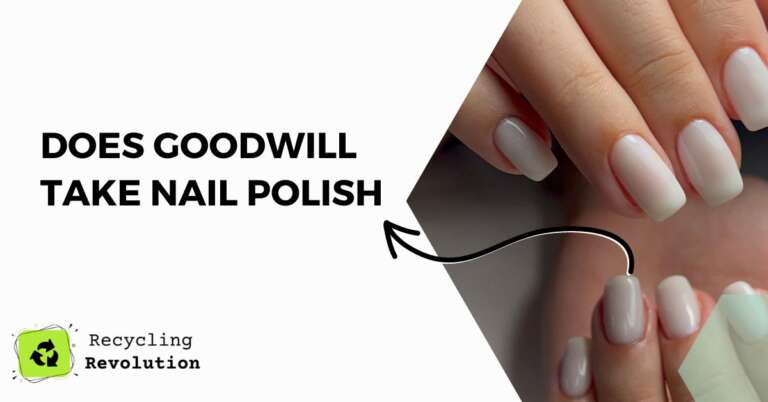In the labyrinth of thrift store offerings, Goodwill Industries International stands tall. With a noble mission to “enhance the dignity and quality of life of individuals and families,” Goodwill has been a beacon of sustainability and economic empowerment since its establishment in 1902.
Offering everything from clothing to electronics, this non-profit organization has carved a significant place in the realm of reused and recycled goods.
Importance of Responsible Disposal and Donation of Beauty Products
There’s a certain magic in giving a second life to something that would otherwise gather dust in a drawer or end up in a landfill. This sentiment is especially true for beauty products, including nail polish, which are often tossed aside long before their expiration date.
Donating these items not only contributes to a circular economy but also helps reduce waste and pollution, making this world a tad bit more beautiful.
Specific Considerations for Beauty and Personal Care Items
Donating personal care items, such as nail polish, involves some unique considerations. Given the nature of these products, factors like their condition, expiration dates, and packaging are of utmost importance to ensure they’re safe for the next user.
Nail Polish Acceptance Policies and Restrictions
Goodwill’s acceptance of nail polish varies by location, with some branches accepting unopened, unused nail polish, while others restrict or prohibit these donations due to their chemical composition or local laws and regulations. It’s always advisable to call your local Goodwill branch before planning your donation.
Factors to Consider Before Donating Nail Polish
Evaluating the Condition of the Nail Polish
Before donating your nail polish, inspect its condition. Ensure the polish is not dried out or clumpy, which would render it unusable.
Checking for Expiration Dates and Signs of Spoilage
Nail polish typically lasts two years from the time it’s opened. Check for any expiration dates or signs of spoilage, like strange smells or discoloration, before donating.
Packaging and Labeling Requirements
Ensure the nail polish bottle is in good condition, with no cracks or leaks. The labeling should be intact, clearly displaying the brand, shade, and any cautionary statements.
Identifying Prohibited or Restricted Ingredients
Certain ingredients, like toluene or formaldehyde, are increasingly being restricted in beauty products due to potential health risks. Check your nail polish ingredients list before donating, as some Goodwill branches may not accept products containing these ingredients.
Table of Nail Polish Acceptance
| Nail Polish Type | Accepted | Not Accepted |
|---|---|---|
| Unopened/Unused | Yes | No |
| Opened/Used | Varies by location | Varies by location |
| Containing Restricted Ingredients | No | Yes |
| Expired | No | Yes |
| In Poor Condition (Leaky, Cracked, etc.) | No | Yes |
Alternatives to Goodwill for Donating Nail Polish
- Local Shelters or Charities That Accept Beauty Products – If Goodwill cannot accept your nail polish, consider local shelters or charities that offer beauty services. These organizations often appreciate donations of new or gently used nail polish.
- Beauty Product Recycling Programs – Companies like TerraCycle offer recycling programs for beauty products, providing an eco-friendly way to dispose of unwanted nail polish.
- Hosting a Nail Polish Swap or Giveaway – Organizing a nail polish swap among friends or hosting a giveaway on social media can be a fun and sustainable way to rehome your unused polishes.
Preparing Nail Polish for Donation
Cleaning and Organizing Nail Polish Bottles
Ensure your nail polish bottles are clean and presentable. Organizing them by color or brand can help the next user find their perfect shade more easily.
Securing Lids and Packaging to Prevent Leaks or Spills
Make sure all nail polish lids are tightly secured. Any extra packaging that prevents leaks or spills during transport can be helpful.
Providing Accurate Information about Color and Brand, if Requested
If possible, provide accurate information about the color and brand of the nail polish. This information can be vital for those with specific color or brand preferences.
Donating Nail Polish to Goodwill
Locating a Nearby Goodwill Donation Center
You can find your nearest Goodwill donation center using their online locator. Remember, each branch might have different policies regarding nail polish donations.
Contacting the Local Goodwill Branch for Specific Policies
To avoid confusion and ensure your donation meets their requirements, reach out to your local Goodwill branch. They can provide the most accurate information about their specific nail polish acceptance policies.
Best Practices for Dropping off Donations
When dropping off donations, do so during the branch’s business hours. Pack your items carefully to prevent any damage, and follow any specific instructions provided by the Goodwill staff.
Conclusion
When you donate beauty products like nail polish to Goodwill, you’re supporting sustainability and helping the community. But, not all Goodwill stores can take nail polish due to various reasons like safety, condition, and local laws.
Before you donate, make sure the polish isn’t dried up, cracked, or expired, and that it doesn’t have any restricted ingredients. If Goodwill can’t take it, try local shelters, recycling programs, or swaps with friends. Always call your local Goodwill before donating to know their rules, and if you do donate, give during their business hours and pack everything safely. Your donations can make a big difference in creating a sustainable and positive impact.
FAQs
Is everything used in Goodwill?
Not necessarily. While Goodwill is known for selling used goods, it also accepts and sells new items. However, the majority of items sold by Goodwill are used.
What will Goodwill not take in Wisconsin?
Goodwill in Wisconsin, like many other locations, will not accept hazardous materials, weapons, recalled items, or any items in poor condition that cannot be resold.
What items does Goodwill not accept?
Goodwill typically doesn’t accept items such as mattresses, hazardous materials, broken electronics, or any item that isn’t in sellable condition. Always check with your local branch for specific guidelines.

